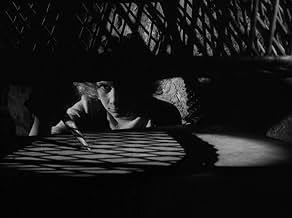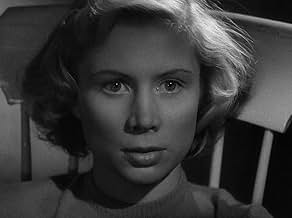CALIFICACIÓN DE IMDb
6.7/10
2.3 k
TU CALIFICACIÓN
Un director de cine recibe la visita de su antiguo profesor de matemáticas que sale de un asilo. Éste le propone realizar una película sobre el tema: "Nuestro mundo es el infierno y el diabl... Leer todoUn director de cine recibe la visita de su antiguo profesor de matemáticas que sale de un asilo. Éste le propone realizar una película sobre el tema: "Nuestro mundo es el infierno y el diablo lo dirige todo".Un director de cine recibe la visita de su antiguo profesor de matemáticas que sale de un asilo. Éste le propone realizar una película sobre el tema: "Nuestro mundo es el infierno y el diablo lo dirige todo".
Birgit Lindkvist
- Anna
- (as Bibi Lindkvist)
John W. Björling
- Man in Birgitta's Dream
- (sin créditos)
Sven Björling
- Filmworker at Film Studio
- (sin créditos)
Anita Blom
- Anna
- (sin créditos)
Britta Brunius
- Lasse's Mother
- (sin créditos)
Åke Engfeldt
- Police Officer
- (sin créditos)
Gösta Ericsson
- Police Officer
- (sin créditos)
Kenne Fant
- Arne
- (sin créditos)
- Dirección
- Guionista
- Todo el elenco y el equipo
- Producción, taquilla y más en IMDbPro
Opiniones destacadas
An ex Maths teacher announces he's just been released from a lunatic asylum (as you do) to some people making a film. (He used to teach one of them). He says that he has ideas about the Devil. The filmmakers try to adapt those ideas into a screenplay. Apparently they reject those ideas -after making them - for this film presumably.
The meandering narrative seems to explore scenarios that surround some pretty miserable and uninteresting people. I think I read that it's Bergman's first film to look solely at mild horror and the place of the Devil, both in philosophy, film and in folklore. Suicide, alcoholism, prostitution, even drowning babies born to the under-aged get limp, clumsy and unconvincing treatment.
It's pretty impossible to follow and no doubt spoilt by knowing what gems came later from the Master of Darkness.
Best thing to come out of it was a line that I've slightly altered - "Life Itself is a terminal illness "
The meandering narrative seems to explore scenarios that surround some pretty miserable and uninteresting people. I think I read that it's Bergman's first film to look solely at mild horror and the place of the Devil, both in philosophy, film and in folklore. Suicide, alcoholism, prostitution, even drowning babies born to the under-aged get limp, clumsy and unconvincing treatment.
It's pretty impossible to follow and no doubt spoilt by knowing what gems came later from the Master of Darkness.
Best thing to come out of it was a line that I've slightly altered - "Life Itself is a terminal illness "
"Prison" (1949) is the first film in which Ingmar Bergman develops something like a style of his own.
We see various elements that reappear in later movies. There is the character of death (to reappear in "The seventh seal", 1957) and dreamsequences (to reappear in "Wild strawberries", 1957).
The most important sign for things to come is however the theme of the film. The film is about a director trying to make a film about a world governed by the devil. Is a world governed by the devil not very much like a wordl where God is silent? Later Bergman would make a trilogy around this theme consisting of the films "Through a glass darkly" (1961), "Winterlight" (1963) and "The silence" (1963).
So in "Prison" Bergman started to experiment with a personal style, but this style was not fully developed yet. There are good sequences (such as the dream sequence) but as a whole the film is somewhat cluttered and inaccessible. Moreover the film in a film format about a director struggling to make a film does not work very well in "Prison". It does work very well in "8,5" (1963, Federico Fellini), but the Bergman of 1949 is not the Fellini of 1963.
We see various elements that reappear in later movies. There is the character of death (to reappear in "The seventh seal", 1957) and dreamsequences (to reappear in "Wild strawberries", 1957).
The most important sign for things to come is however the theme of the film. The film is about a director trying to make a film about a world governed by the devil. Is a world governed by the devil not very much like a wordl where God is silent? Later Bergman would make a trilogy around this theme consisting of the films "Through a glass darkly" (1961), "Winterlight" (1963) and "The silence" (1963).
So in "Prison" Bergman started to experiment with a personal style, but this style was not fully developed yet. There are good sequences (such as the dream sequence) but as a whole the film is somewhat cluttered and inaccessible. Moreover the film in a film format about a director struggling to make a film does not work very well in "Prison". It does work very well in "8,5" (1963, Federico Fellini), but the Bergman of 1949 is not the Fellini of 1963.
The real prison is in the minds of these people, and in Bergman's in particular. Bergmann was always obsessed with depression and death; it was in all his fllms. Just like violence is in every Sergio Leone film, some directors are obsessed with one emotion or another. In this one, we find supposedly talented artists are having a difficult time with life. O poor little me! Get over it. People with real talent don't get despondent, they get to work. They may get down once in a while, but they bounce back from adversity, and overcome it. These wusses do not. They expect miracles from their mediocre talents and efforts, and are disappointed when they are not recognized as geniuses or great artists. You know how many years Bogart or Streep had to struggle before they became major stars? A lot longer than these no-talents. I hate agreeing with Woody Allen, but Bergmaaaaan is a joke; a bad joke at that. At least the photography is interesting.
Bergman's first film where he wrote his own script, and had real artistic control (in exchange for a tiny budget.).
An aging film professor, just released from a mental asylum, visits an old student, now a successful director, and challenges him to make a film showing that the devil really rules the earth. While dismissive in the moment, the director is haunted by the idea, and a journalist friend suggests the film could take off from his experience interviewing a very young prostitute.
We then enter the prostitute's story, and it's (intentionally) never fully clear if what we're seeing is the film that arose from the concept, or the truth of the girl's life.
Beautifully photographed, and full of inventive touches (the main credits are spoken, not seen, over a long tracking shot of a dark cobblestone street), I was also surprised that it contained more of a dark sense of humor, about itself and the world, then most critics acknowledge. In turn, that keeps the film's occasional youthful over-obsession with despair from ever feeling unbearably sophomoric.
I will admit it lost steam for me in the last third, some of the performers aren't quite up to the heavy burdens of the script, and a few sequences are awkward and bespeak Bergman's comparative youth. But the next morning I found myself haunted by images and moments even if the whole only felt partly successful.
An aging film professor, just released from a mental asylum, visits an old student, now a successful director, and challenges him to make a film showing that the devil really rules the earth. While dismissive in the moment, the director is haunted by the idea, and a journalist friend suggests the film could take off from his experience interviewing a very young prostitute.
We then enter the prostitute's story, and it's (intentionally) never fully clear if what we're seeing is the film that arose from the concept, or the truth of the girl's life.
Beautifully photographed, and full of inventive touches (the main credits are spoken, not seen, over a long tracking shot of a dark cobblestone street), I was also surprised that it contained more of a dark sense of humor, about itself and the world, then most critics acknowledge. In turn, that keeps the film's occasional youthful over-obsession with despair from ever feeling unbearably sophomoric.
I will admit it lost steam for me in the last third, some of the performers aren't quite up to the heavy burdens of the script, and a few sequences are awkward and bespeak Bergman's comparative youth. But the next morning I found myself haunted by images and moments even if the whole only felt partly successful.
I am a big Begman fan, and in recent times I've gone back to some of the early films - initially just because I thought it might be interesting to see the "juvenilia", but gradually I realised that so many of them are wonderful. I've now seen Prison 4 times, and each time I am stunned by how moving and visually powerful it is. And the performance by Doris Svedlund is breath-taking. Is it the most polished film? Who cares!
Bergman did many dream sequences in films (e.g. Wild Strawberries, Face to Face) - really hard to make them un-cringey - but the one in Prison is about as good as it gets.
So wonderful artistically, and very moving in terms of human interest. There is an orthodoxy about peoples "great" films which often gets in the way of just seeing what is there - please do watch great Bergman film .. I hope you won't be disappointed!
Bergman did many dream sequences in films (e.g. Wild Strawberries, Face to Face) - really hard to make them un-cringey - but the one in Prison is about as good as it gets.
So wonderful artistically, and very moving in terms of human interest. There is an orthodoxy about peoples "great" films which often gets in the way of just seeing what is there - please do watch great Bergman film .. I hope you won't be disappointed!
¿Sabías que…?
- TriviaIngmar Bergman's first film based on his own original screenplay.
- Créditos curiososThere are no opening titles in this film. An unseen narrator (Hasse Ekman) reads the credits, as well as the title, out loud approximately ten minutes in to the movie. The sole title card is the standard "Slut" (Swedish for "End") that closes the picture.
- ConexionesEdited into Histoire(s) du cinéma: Une histoire seule (1989)
- Bandas sonorasDrömmen
Composed by Erland von Koch (1949)
Selecciones populares
Inicia sesión para calificar y agrega a la lista de videos para obtener recomendaciones personalizadas
- How long is Prison?Con tecnología de Alexa
Detalles
Taquilla
- Presupuesto
- SEK 240,000 (estimado)
- Tiempo de ejecución1 hora 19 minutos
- Color
- Mezcla de sonido
- Relación de aspecto
- 1.33 : 1
Contribuir a esta página
Sugiere una edición o agrega el contenido que falta

Principales brechas de datos
By what name was La prisión (1949) officially released in India in English?
Responda































